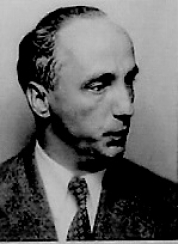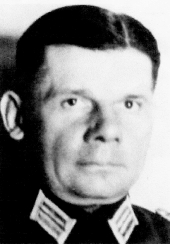Huber, Professor Kurt, born on 24-10-1893 in Chur, Swiss,  the son of German parents. When Kurt was four, his parents moved to Stuttgart and after his father’s death when young Kurt was at the Gymnasium, his mother moved with him and his three siblings to Munich.
the son of German parents. When Kurt was four, his parents moved to Stuttgart and after his father’s death when young Kurt was at the Gymnasium, his mother moved with him and his three siblings to Munich.
 the son of German parents. When Kurt was four, his parents moved to Stuttgart and after his father’s death when young Kurt was at the Gymnasium, his mother moved with him and his three siblings to Munich.
the son of German parents. When Kurt was four, his parents moved to Stuttgart and after his father’s death when young Kurt was at the Gymnasium, his mother moved with him and his three siblings to Munich.Supported in his childhood love of music by his family, at university he chose to study music, psychology and philosophy. His initial attempts to find a job as a psychology professor were thwarted by Nazi accusations of a neurological handicap caused by a childhood disease. During these early years of financial difficulty, newly married and the father of young children, Huber became increasingly active in the revival of German, especially Bavarian, folk music. He organised folk music festivals, encouraged the transmission of folk music traditions, and collected and recorded songs and melodies. Due to his success in these endeavours, in 1927 he was offered a position as a musicologist in Berlin. Still without the permanent position he wanted, he and his wife and children returned to Munich, where he was hired as a professor of folk music. He developed a friendship with the German composer, music educator and theater man. Carl Heinrich Maria Orff, 
 and published and lectured on the Bavarian folk tradition. Orff died 29-03-1982 (aged 86) in Munich, West Germany.
and published and lectured on the Bavarian folk tradition. Orff died 29-03-1982 (aged 86) in Munich, West Germany.

 and published and lectured on the Bavarian folk tradition. Orff died 29-03-1982 (aged 86) in Munich, West Germany.
and published and lectured on the Bavarian folk tradition. Orff died 29-03-1982 (aged 86) in Munich, West Germany.Complications from rickets and diphtherias had left him with a pronounced limp with his left foot and a right hand that felt almost constantly numb. For these reasons, he was excused from military service in WWI. Despite these physical disabilities, Kurt Huber showed exceptional musical talent as a child and would later go on to become one of Germany’s foremost experts in German folk-music. He earned a doctorate at LMU in the early 1920s and even though he stammered, especially as he began to speak, he became an associate professor at his alma mater. In 1929, he married Clara, born, Schlickenrieder Huber (1908-1998)
The couple would go on to have two children, Birgit Huber Weiss (1930-2012) and Wolfgang. In 1937, Kurt was offered a prestigious position at the Institute for German Research at the University of Berlin, but his time there lasted only one year because he did not use the position, as it was expected of him to do, to help write and publicize songs for the Nazi regime. As a result, he was forced to return to Munich and to his former position there as associate professor. Nearly everyone involved in the White Rose,
but his time there lasted only one year because he did not use the position, as it was expected of him to do, to help write and publicize songs for the Nazi regime. As a result, he was forced to return to Munich and to his former position there as associate professor. Nearly everyone involved in the White Rose,  whether it be in Munich, Hamburg, Ulm, or anywhere else was in their early-to-mid 20s.
whether it be in Munich, Hamburg, Ulm, or anywhere else was in their early-to-mid 20s.
The couple would go on to have two children, Birgit Huber Weiss (1930-2012) and Wolfgang. In 1937, Kurt was offered a prestigious position at the Institute for German Research at the University of Berlin,
 but his time there lasted only one year because he did not use the position, as it was expected of him to do, to help write and publicize songs for the Nazi regime. As a result, he was forced to return to Munich and to his former position there as associate professor. Nearly everyone involved in the White Rose,
but his time there lasted only one year because he did not use the position, as it was expected of him to do, to help write and publicize songs for the Nazi regime. As a result, he was forced to return to Munich and to his former position there as associate professor. Nearly everyone involved in the White Rose,  whether it be in Munich, Hamburg, Ulm, or anywhere else was in their early-to-mid 20s.
whether it be in Munich, Hamburg, Ulm, or anywhere else was in their early-to-mid 20s.The White Rose, pronounced was a non-violent, intellectual resistance group in Nazi Germany which was led by five students and one professor at the University of Munich: Willi Graf, Kurt Huber, Christoph Probst, Alexander Schmorell, Hans Scholl and Sophie Scholl. The group conducted an anonymous leaflet and graffiti campaign that called for active opposition to the Nazi regime.
Professor Kurt Huber, however, was neither a student nor a soldier. Instead, he was a university professor which most of the core group of White Rose members looked up to and yet he neither started nor led this group. Professor Huber’s lectures in philosophy were some of the most popular on campus, attracting many students who were not even enrolled in his classes to his lectures. He was a lone voice of sanity there, and walked a very fine line insofar as he dared say things that most others would not, but, for example, would say them couched in with sarcasm or in such a way in which it would be hard to find fault. As students of LMU, Scholl Hans and Sophie, Alexander Schmorell,  and Willi Graf
and Willi Graf  in particular, knew who Professor Huber was and made themselves known to him.
in particular, knew who Professor Huber was and made themselves known to him.  Another Weisse Rose membere was Falk Harnack
Another Weisse Rose membere was Falk Harnack
 and Willi Graf
and Willi Graf  in particular, knew who Professor Huber was and made themselves known to him.
in particular, knew who Professor Huber was and made themselves known to him.  Another Weisse Rose membere was Falk Harnack
Another Weisse Rose membere was Falk Harnack
 Harnack was the son of literary scientist Otto Harnack.
Harnack was the son of literary scientist Otto Harnack.  His uncles were the theologian Adolf von Harnack and the chemist and physicist Erich Harnack. His grandfather was the theologian Theodosius Harnack.
His uncles were the theologian Adolf von Harnack and the chemist and physicist Erich Harnack. His grandfather was the theologian Theodosius Harnack.  His older brother was the resistance fighter Arvid Harnack.
His older brother was the resistance fighter Arvid Harnack. 
 Both were cousins of theologian Dietrich Bonhoeffer and Ernst von Harnack.
Both were cousins of theologian Dietrich Bonhoeffer and Ernst von Harnack. 
 Falk Harnack survived the war and died 03-09-1991, age 78, in Berlin. Another member survived the war Marie-Luise Jahn
Falk Harnack survived the war and died 03-09-1991, age 78, in Berlin. Another member survived the war Marie-Luise Jahn 
 Marie Jahn after Hans and Sophie Scholl and Christoph Probst had been imprisoned she continued to publish the Scholl leaflets and collected money to aid the widow of Kurt Huber. In October 1943 she was also arrested by the Gestapo
Marie Jahn after Hans and Sophie Scholl and Christoph Probst had been imprisoned she continued to publish the Scholl leaflets and collected money to aid the widow of Kurt Huber. In October 1943 she was also arrested by the Gestapo  and sentenced to 12 years’ imprisonment by the Volksgerichtshof in 1944. Marie-Luise Jahn survived and died old age 92 on on 22-06-2010 in Bad Tölz.
and sentenced to 12 years’ imprisonment by the Volksgerichtshof in 1944. Marie-Luise Jahn survived and died old age 92 on on 22-06-2010 in Bad Tölz.The Gestapo, short for Geheime Staatspolizei (until 1936 also Gestapa, for Geheimes Staatspolizeiamt), was the political or secret police in Nazi Germany (1933 – 1945). The central Gestapo headquarters was located at 8 Prinz-Albrecht-Strasse in Berlin. 

When Sophie Scholl attended LMU, she had at least one class of Huber and Katharina Schüddekopf, Schüddekopf age 28 got one year in prison, who would become friends with most of the members of the White Rose, was a doctoral student of his. She attended, by invitation, “reading evenings” at the Schmorell villa, and was present at the good-bye party for Hans, Alex, and Willi at Manfred Eickemeyer’s studio before they were sent to Russia. Hans and Alex approached the subject of the leaflets of the White Rose in December 1942, revealing to him that they had authored them. Professor Huber was not sure that the leaflets were a good idea, considering how much risk was being undertaken for what would probably be very little effect amongst the people. However, after the ridiculous speech the Gauleiter Paul Giesler  made, and seeing the reaction of the students, he was willing to provide active help to the group. Hans and Alex presented him drafts for the fifth leaflet, and after seeing both, picked Hans’, but helped edit it. The fall of Stalingrad shook Professor Huber greatly, as it did many Germans. In response, he wrote what was to become the sixth leaflet of the White Rose.
made, and seeing the reaction of the students, he was willing to provide active help to the group. Hans and Alex presented him drafts for the fifth leaflet, and after seeing both, picked Hans’, but helped edit it. The fall of Stalingrad shook Professor Huber greatly, as it did many Germans. In response, he wrote what was to become the sixth leaflet of the White Rose.
 made, and seeing the reaction of the students, he was willing to provide active help to the group. Hans and Alex presented him drafts for the fifth leaflet, and after seeing both, picked Hans’, but helped edit it. The fall of Stalingrad shook Professor Huber greatly, as it did many Germans. In response, he wrote what was to become the sixth leaflet of the White Rose.
made, and seeing the reaction of the students, he was willing to provide active help to the group. Hans and Alex presented him drafts for the fifth leaflet, and after seeing both, picked Hans’, but helped edit it. The fall of Stalingrad shook Professor Huber greatly, as it did many Germans. In response, he wrote what was to become the sixth leaflet of the White Rose.
 that he had written, and they wanted to distribute it, but without the line referring to supporting the “glorious” Wehrmacht. Professor Huber refused, as he considered the Wehrmacht the only hope for successfully overthrowing Adolf Hitler
that he had written, and they wanted to distribute it, but without the line referring to supporting the “glorious” Wehrmacht. Professor Huber refused, as he considered the Wehrmacht the only hope for successfully overthrowing Adolf Hitler  (did you know). He told Hans and Alex that that line would be included, or he didn’t want the leaflet printed at all, and ended up storming out. The other members of the White Rose would go on to print and distribute this leaflet, sans the line about the Wehrmacht. This was the leaflet that Hans and Sophie were distributing at LMU
(did you know). He told Hans and Alex that that line would be included, or he didn’t want the leaflet printed at all, and ended up storming out. The other members of the White Rose would go on to print and distribute this leaflet, sans the line about the Wehrmacht. This was the leaflet that Hans and Sophie were distributing at LMU 
 the day they were caught. Professor Kurt Huber was arrested in his home on Friday, February 26th. By this time, Hans, Sophie, and Christoph all had been arrested, tried by Nazi jurist, Roland Freisler
the day they were caught. Professor Kurt Huber was arrested in his home on Friday, February 26th. By this time, Hans, Sophie, and Christoph all had been arrested, tried by Nazi jurist, Roland Freisler
 and executed. He knew that his arrest was inevitable, and so in the meantime, he went about burning papers and getting rid of books for when that time came.
and executed. He knew that his arrest was inevitable, and so in the meantime, he went about burning papers and getting rid of books for when that time came.Death and burial ground of Huber, Professor Kurt.



 He was brought to trial on 19 April, in the second of the “White Rose” trials. Once again, Roland Freisler presided as judge. Along with Willi Graf and Alexander Schmorell, he was found guilty and sentenced to death. The trial was so much a mockery of justice that after hearing the leaflets of the White Rose read aloud, Professor Huber’s lawyer quit, and, despite the fact that other lawyers present there were not familiar with the case, one was picked pretty much at random to defend him. The date of execution was set at 13 July, and as that date drew nearer, it looked as if he would not be able to finish his book in time. He requested that the date of execution be pushed back two weeks so as to be able to finish the book, but this request was denied. Seeing him continue his work in this manner, the Catholic chaplain at Stadelheim prison, Father Ferdinand Brinkmann, remarked, “There sat Kurt Huber, continuing the work he had chosen to do, even with certain death before his eyes. It came to me with terrible clarity – this was a picture of the spiritual situation of Germany – the human spirit imprisoned and sentenced to death.” Professor Kurt Huber died on the guillotine
He was brought to trial on 19 April, in the second of the “White Rose” trials. Once again, Roland Freisler presided as judge. Along with Willi Graf and Alexander Schmorell, he was found guilty and sentenced to death. The trial was so much a mockery of justice that after hearing the leaflets of the White Rose read aloud, Professor Huber’s lawyer quit, and, despite the fact that other lawyers present there were not familiar with the case, one was picked pretty much at random to defend him. The date of execution was set at 13 July, and as that date drew nearer, it looked as if he would not be able to finish his book in time. He requested that the date of execution be pushed back two weeks so as to be able to finish the book, but this request was denied. Seeing him continue his work in this manner, the Catholic chaplain at Stadelheim prison, Father Ferdinand Brinkmann, remarked, “There sat Kurt Huber, continuing the work he had chosen to do, even with certain death before his eyes. It came to me with terrible clarity – this was a picture of the spiritual situation of Germany – the human spirit imprisoned and sentenced to death.” Professor Kurt Huber died on the guillotine  on 13-07-1943, age 49 and is buried with his wife Clara, born Schlickenrieder, who died old age 89, on 28-03-1998, on the Waldfriedhof of Munich.
on 13-07-1943, age 49 and is buried with his wife Clara, born Schlickenrieder, who died old age 89, on 28-03-1998, on the Waldfriedhof of Munich.

Message(s), tips or interesting graves for the webmaster: robhopmans@outlook.com
















Leave a Reply